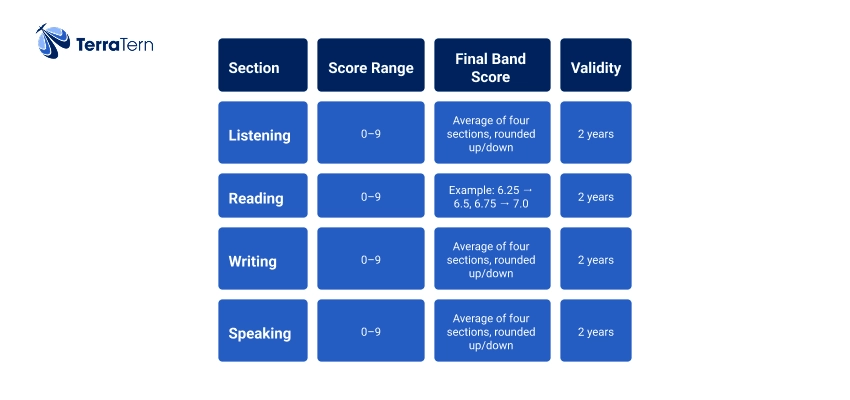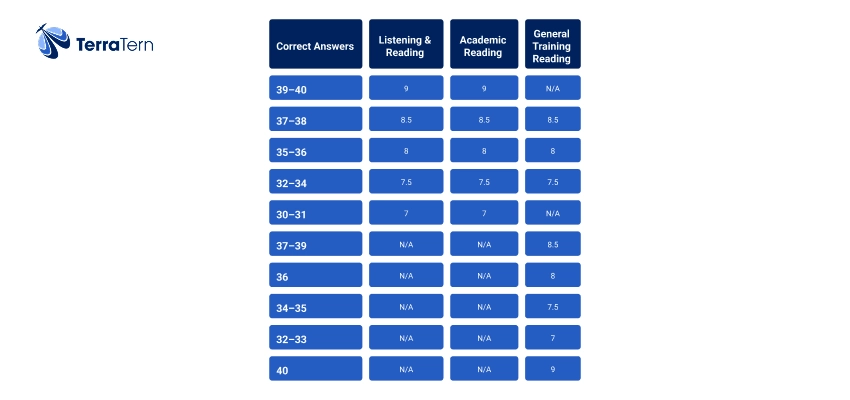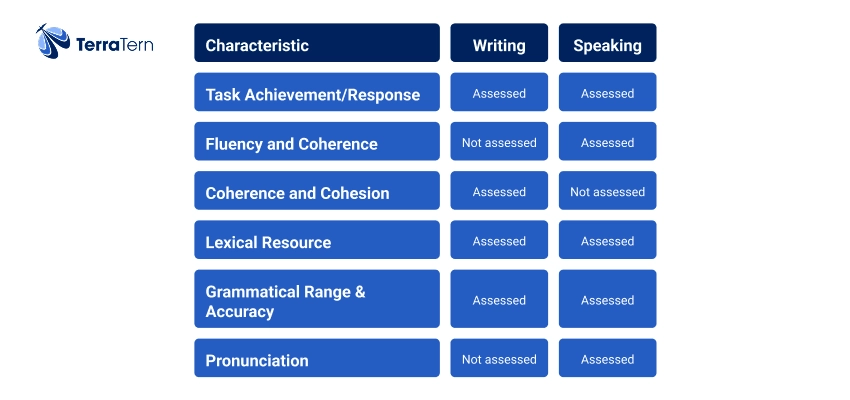Key Highlights
- Latest Facts and News
- IELTS Marking System Explained
- IELTS Listening Marking System
- Common Mistakes That Affect Listening Scores
- The Best Tricks to Maximise the Marks in Listening
- IELTS Reading Marking System
- Strategies for a High Score in Reading
- IELTS General Marking System
- Key Assessment Criteria for IELTS Writing and Speaking
- Tips to Maximise Your IELTS Score
- Common Mistakes to Avoid in the IELTS Exam
- How to Prepare for the IELTS Marking System?
- Conclusion
The marking system of IELTS is a very essential aspect of success at the IELTS exam. Being well aware of the process of evaluation of each of the sections not only enables you to focus on your preparation angles effectively but also enables you to credit yourself with a higher band score. Are you intending to go to school abroad, move, or take a professional test? Understanding the IELTS marking system can give you a competitive advantage. The score in the four sections of IELTS Listening, Reading, Writing, and Speaking is determined separately, and then the average of all four is calculated to give the final score.
Are you curious about the workings of the IELTS exam marking system? Get recent news and information about the IELTS marking system a must-know to get a band score!
Latest Facts and News

-
IELTS 2025 News: The marking system will be the same, yet in the test centres, more and more focus will be on digital test administration and quick results.
-
Transparency of Scoring: IELTS has improved by providing more detailed feedback on the band descriptors for each section.
-
International Recognition: IELTS is acceptable in more than 11,000 organisations globally as part of their study, employment, and migration needs.
-
Type of Test: The type of test to which the marking system is applied includes academic and general training ones; however, the requirements for their band scores may vary.
-
Digital Transformation: More candidates are choosing computer-delivered IELTS, with the same criteria of marking criteria as with the paper-based version.
-
Speaking and Writing: Human examiners do mark these parts, and their reliability and fairness is high.
-
Listening and Reading: Computer-delivered IELTS has these marked automatically and with consistent criteria.
-
Score Reporting: The scores of Computer-Delivered IELTS are declared online in 3-5 days.
-
Score Validity: Valid scores on the IELTS have a validity period of two years.
Wondering how the IELTS marking system is computed? Read about the latest knowledge and information on the IELTS marking scheme that you need to get a high band in your exams!"
IELTS Marking System Explained

It is important to know how the IELTS marking system works, so that you can decode the scores that you get about how well you do. In every section (listening, reading, writing, and speaking), one scoring scale is used to determine the scores on each section to make the marking fair and consistent. This section will deconstruct the IELTS exam marking system and explain how to determine your overall band score.
How the IELTS Overall Band Score is Calculated?
Your IELTS band score is not a matter of summing up marks. All four sections (listening, reading, writing, and speaking) are examined separately, and their average is adjusted to the nearest four decimals or whole band. This is how the IELTS marking system and rounding work.
Rounding Rules
|
Average Score |
Final Band Score |
|
6.125 |
6.0 |
|
6.25 |
6.5 |
|
6.75 |
7.0 |
|
7.875 |
8.0 |
Important Guidelines:
-
When the average score is a half point less than the required bands on the half (e.g., 6.25), then it is rounded up in the next half band (i.e. 6.25 will be rounded up to the next half band, which is 6.5).
-
The average should be rounded up to the next whole band in case it has digits after a decimal point (e.g. 6.75 would be 7.0).
-
Any mark that falls below .25 or .75 will be rounded down (ex. 6.125 will get rounded off to 6.0).
Also Read: Is 7.5 a Good IELTS Score? Here is the Truth
IELTS Listening Marking System
The IELTS Listening proficiency test has an objective-based IELTS listening marking system where a candidate is tested on how they can comprehend the English language under different accents and settings. Having 40 questions and the simplest one-mark question structure, it is vital to be aware of the way your answers will be summed up and translated into a band score and be prepared for this process when trying to study to pass the test successfully and conquer the IELTS listening marking system.
Band Score Conversion Table
Here is the band score IELTS exam marking system table:
|
Raw Score (out of 40) |
Band Score |
|
39–40 |
9 |
|
37–38 |
8.5 |
|
35–36 |
8 |
|
32–34 |
7.5 |
|
30–31 |
7 |
Common Mistakes That Affect Listening Scores
Here are some common mistakes you should avoid to conquer the IELTS marking system:
-
Poor Spelling: All the responses should be we​​ll spelt. A simple spelling error means that it is awarded zero marks.
-
Grammar inconsistency: In case the answer is grammatically inappropriate in the formulation of the sentence (e.g., plural vs. singular), the answer is marked erroneous.
-
Misinterpretation of Instructions: Some questions demand a certain number of words or a certain format; going beyond the words given will result to a penalty.
-
Transferring Errors: Wrong copying of answers on the answer sheet may lower your score, especially in the paper test.

The Best Tricks to Maximise the Marks in Listening
Here are some of the best tricks to maximise your score to conquer the IELTS marking system:
-
Do listening tests in authentic situations and practice the test scenario.
-
First, learn to identify keywords and synonyms, as IELTS often paraphrases texts.
-
Improve your spelling and grammar by going through your mistakes.
-
Train multitasking ability and focus on listening and writing at the same time.
-
In paper-based tests, there is a period of transfer, and at any of these times, it is always important to check answers twice.
IELTS Reading Marking System

The IELTS reading marking system is critical to your ability to read and write correctly when facing the clock. There are a total of 40 questions of different types; however, every correct answer is counted separately towards your raw score, which is counted as a band score. Knowing this system is the most strategic reading preparation.
Academic Reading Conversion Table
Here is a breakdown of the IELTS reading marking system:
|
Raw Score |
Band Score |
|
39–40 |
9 |
|
37–38 |
8.5 |
|
35–36 |
8 |
|
32–34 |
7.5 |
|
30–31 |
7 |
General Training Reading Conversion Table
Here is a breakdown of the reading conversion for the IELTS marking system:
|
Raw Score |
Band Score |
|
40 |
9 |
|
37–39 |
8.5 |
|
36 |
8 |
|
34–35 |
7.5 |
|
32–33 |
7 |
Strategies for a High Score in Reading
Here are some strategies for high scores that will help conquer the IELTS marking system:
-
Effectively use skimming and scanning to find information without reading word-for-word.
-
Learn what types of questions they are (e.g. True/False/Not Given, Matching Headings), and practice.
-
Paraphrasing is very necessary; IELTS includes synonyms and various wordings, which help you understand the material better.
-
Listen to the plurals and tenses of the questions; they usually allude to the right answer.
-
Never leave a question blank; simply give a guess when you are not sure.
IELTS General Marking System
The IELTS marking system is a special system that suits individuals who want to migrate, work, or train in English-speaking nations. It has common fundamental principles of the IELTS general marking system with the academic test, but certain differences in the reading and writing sections, including the type of tasks, language style, and the conversion of band scores, also apply. Let’s learn more about the IELTS general marking system!
Key Differences
-
Reading: The passages tend to be easier and are derived from real-life situations, such as notices and advertisements. The scoring, however, is more rigorous at the higher bands in compensation.
-
Writing Task 1: However, a letter (formal, semi-formal, or informal) is required, and the score is based on tone, structure, coherence, and completion of the task.
Why It Is Noteworthy:
-
The knowledge of the distinctive quality of the task helps you to organise your answers adequately.
-
The knowledge about the differences in the scoring will allow one to prepare more explicitly, at least about such modules as the General Writing Task 1.
Key Assessment Criteria for IELTS Writing and Speaking

To achieve a high band score in the IELTS Writing and Speaking sections, it's essential to understand the specific assessment criteria examiners use in the IELTS marking system. These standardised benchmarks evaluate your performance across four key areas, helping ensure a fair and transparent scoring process for every test taker. Let's explore the IELTS marking system in detail.
Writing Section: 4 Assessment Criteria
Here is a complete breakdown of the writing section’s IELTS marking system criteria:
-
Task Achievement/Task Response:
-
Directly addresses all parts of the task.
-
Presents a clear, well-developed position or purpose.
-
Supports ideas with relevant examples or evidence.
-
Coherence and Cohesion:
-
Organises ideas logically using clear paragraphs.
-
The author effectively connects sentences and ideas using appropriate linking devices such as 'however' and 'therefore'.
-
Lexical Resource:
-
Demonstrates a wide range of vocabulary relevant to the topic.
-
Avoids overuse of common or simple words.
-
Effectively uses collocations and idiomatic expressions.
-
Grammatical Range and Accuracy:
-
Uses various grammatical structures.
-
Maintains control over sentence structure, verb tense, and punctuation.
-
Minimises grammatical errors.

Speaking Section: 4 Assessment Criteria
Here is a complete breakdown of the speaking section’s IELTS marking system criteria:
-
Fluency and Coherence:
-
Speaks at length without noticeable hesitation.
-
Connects ideas logically and clearly.
-
Lexical Resource:
-
Uses varied vocabulary suited to different topics.
-
Paraphrases when specific vocabulary is lacking.
-
Grammatical Range and Accuracy:
-
Utilises both simple and complex sentence forms.
-
Maintains grammatical accuracy without frequent errors.
-
Pronunciation:
-
Speaks clearly and naturally.
-
Uses proper intonation, rhythm, and word stress.
-
It is easy to understand despite the accent.
Also Read: IELTS Course Fee: Latest Guide to IELTS Course Duration and Fees
Tips to Maximise Your IELTS Score

Maximising your IELTS score requires more than just understanding English—it demands a strategic approach tailored to each section to conquer the IELTS marking system. With the right preparation techniques, consistent practice, and attention to the IELTS marking criteria, you can significantly boost your performance and reach your target band. Here are expert-backed tips to help you conquer the IELTS marking system.
1. Familiarise Yourself with the Test Format:
- Learn the structure and timing of each section to avoid surprises on test day.
- Understand the difference between the academic and general versions.
2. Utilise Official IELTS Practice Materials:
- Use resources from IELTS.org, IDP, and the British Council for accurate practice.
- Analyse sample answers and compare them with the scoring criteria.
3. Develop a Vocabulary Log:
- Maintain a notebook of new words, phrases, and idioms.
- Practice using these in context to boost retention.
4. Master Grammar Fundamentals:
- Revisit tenses, sentence structure, subject-verb agreement, and articles.
- Solve grammar-specific exercises and take feedback from tutors.
5. Practice Speaking with Feedback:
- Record yourself responding to sample questions.
- Listen for fillers, hesitation, or grammar mistakes.
- Get evaluated by a tutor or a speaking partner.
6. Improve Writing Skills through Drafting:
- Write essays regularly and review them critically.
- Focus on improving structure, vocabulary, and coherence with each attempt.
7. Strengthen Reading and Listening Comprehension:
- Read a mix of news articles, journals, and fiction.
- Listen to podcasts and TED Talks to improve speed and understanding.
Common Mistakes to Avoid in the IELTS Exam
Even the very well-equipped IELTS test takers can lose significant points in their pursuit because of some inevitable errors. Knowing the typical traps identified in all four parts, Blue, Listening, Reading, Writing, and Speaking, you will feel free to be more confident and accurate in them. Here are some common mistakes and strategies to avoid them to achieve a higher band score that can come in the way of your conquering the IELTS marking system.
-
Preservation of Questions: Do not copy the words used in the prompt verbatim; put them in your own words.
-
Blank Answers: There is no negative marking; therefore, answer all questions.
-
Mismatched Tone in Letters: Having written in an informal tone in a formal letter should lower your score.
-
Use of Overused Templates or Memorable Phrases: Examiners know how to identify pre-learned material, and they punish accordingly.
How to Avoid These Mistakes:
-
Take up proofreading and checking the time during the practice sessions.
-
He/she should learn how to paraphrase in his/her words, starting with the questions.
-
Learn tone and form by using letters and essays as samples.
-
Carry out practice every day to lessen the reliance on the templates.
How to Prepare for the IELTS Marking System?
Preparing effectively for the IELTS marking system means more than just studying English—it involves understanding how examiners score each section. By aligning your practice with the official band descriptors and assessment criteria, you can strategically target improvements and maximise your band score across all four modules.
-
Understand What Examiners Look For:
-
Study official band descriptors to know how your performance will be evaluated.
-
Take Mock Tests Under Exam Conditions:
-
Simulate the full test in one sitting with strict timing.
-
Use headphones and official answer sheets for an authentic experience.
-
Use Trusted IELTS Resources:
-
Websites like IELTS.org, IDP, and the British Council offer free tests, videos, and guides.
-
Track Your Progress Regularly:
-
Maintain a score journal, noting areas where you consistently lose marks.
-
Get Professional Feedback:
-
Enrol in a prep course or hire an IELTS tutor to get detailed evaluations.
Conclusion
To score your targeted band in the IELTS, you need to understand the IELTS marking system used. You can achieve a much better performance on the IELTS test by learning how to score each of the sections, by matching your preparation to the band descriptors, and by making sure that you do not fall into any of the most common traps. The smarter and more educated you are, and the smarter you are, the better off the outcomes are.
Now is the time to begin to prepare—learn the marking system of IELTS and then set foot on the road to your international aspirations with TerraTern!






